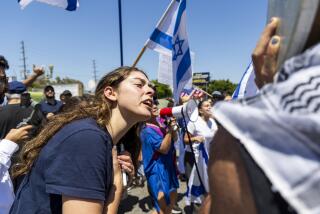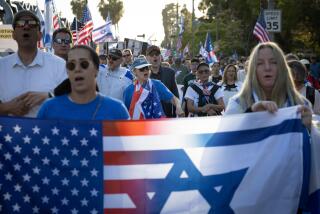Prayer Amid the Tension
Since the Sept. 11 terrorist attacks, two thoughts have become increasingly clear to Thousand Oaks engineer Nabil Mohamed: He hates Osama bin Laden and he hates the Taliban.
Both sentiments were on his mind Friday as he finished Ramadan prayers at the Islamic Center of Conejo Valley and headed back to work.
The negative effects on Muslims in America since the attacks--from suspicious stares to the increased scrutiny by law enforcement--are the result of actions by Bin Laden and the Taliban, Mohamed said.
“Everything that has happened since Day 1 has made every Muslim here feel suspect,” said Mohamed, who is from Egypt. “And ever since the war started, I was hoping that the Taliban would just go away. We had never even heard of Al Qaeda.”
On Friday, Mohamed joined 120 other members of the Borchard Road mosque for the first day of Ramadan prayer services. As they bowed their heads and knelt toward Mecca, they could not have seemed farther from the rugged battlefields of Afghanistan.
But their divergent views--from resentment at Bin Laden for “hijacking Islam” to anger at the U.S. government’s strong military response--mirror the sentiment of many of their friends and relatives half a world away, they said.
“It would be good that in Ramadan, the American military would show mercy,” said Abdul Sayeedi, an Oak Park computer programmer who grew up in Pakistan. “I don’t want to see another person killed in Afghanistan.”
Others say U.S. bombers need to do a better job of narrowing their targets to carefully avoid civilians.
“They are killing the wrong people,” said Habib Khalaj, an Iranian-born dental technician from Newbury Park. “They should go after Bin Laden.”
‘What Happened Hurt Us’
Their dedication to their faith, propped up by a will to see their religion survive and flourish, is getting them through what many consider the most difficult period in their 15 years in the Conejo Valley.
“This is our house of worship and what happened hurt us,” said Mohammad Khan, a Thousand Oaks resident from Pakistan. “But if people come and see us they will see that we are the same as they are.”
What visitors would see, Khan and others say, is an organization beset with the same worries and concerns facing dozens of religious institutions across Ventura County.
They would also see a core group of mainstream Islamic devotees determined to pass on their cultural and spiritual beliefs to their children while trying to keep their mosque in working order through fund-raisers and other means.
“We are still trying to maintain the mosque,” Sayeedi said. “What you see now is an A-plus and it was a C.”
Sayeedi remembers well the days in the mid-80s when he and a few other Muslims, many recent immigrants from the Middle East, took turns hosting Friday afternoon prayer meetings.
The sessions grew so large so fast that soon they were renting space on a temporary basis from a Lutheran church in Newbury Park. They later rented office space in a local industrial park for nearly a decade before purchasing the Borchard Road site in 1997 for about $500,000, mostly in donations.
Fund-raisers have collected nearly $300,000 for remodeling of the building, which city planners say was built in the 1950s as a single-family home before being converted into a preschool and day-care center.
The single-level building sits on a sloping hillside sandwiched between an apartment and condominium complex.
Mosque Leaders Learn Local Politics
Operating costs run about $3,400 each month, said Bader Iqbal, a Westlake Village dentist from Hyderabad, India, who also serves as the mosque’s spokesman. Islamic law forbids the mosque from taking out loans, which adds to the financial burden.
Leaders of the mosque, many raised in the Middle East, have also received a crash course in municipal politics, Thousand Oaks style. Their plans to chop down an old Sycamore tree to expand their parking lot a few years ago were crushed by a determined neighbor who also worked for the city.
“I just told them that a city named after a tree should keep them,” said Grahame Watts, who lives next to the mosque. “I think at first the mosque was bothered by the interruption but later they understood what the tree stood for.”
The city and mosque officials eventually reached an agreement that allowed for both the tree’s survival and the parking lot’s expansion.
Since establishing the mosque, officials have worked to assimilate into the community.
Several mosque members have pledged their support to local civic groups such as the Rotary and Kiwanis clubs. Sherif Ahmed, a 29-year-old native of Egypt, has even created an organization to build understanding between various religious groups and work to prevent discrimination.
And between dental appointments, Iqbal has given talks at local Christian churches about Islam.
The organizer of local interfaith panel discussions, Oxnard Rabbi John Sherwood, said the mosque has played an important role in the county’s religious and social community.
“I love them. They are wonderful, warm people,” said Sherwood, chairman of local ministerial associations. “The people who have come down with hostility toward the Islamic people as far as I’m concerned are racist pigs. These people are my cousins and I care about them.”
A hate crime incident last summer that left anti-Islamic messages scrawled on the mosque’s walls and parking lot shocked members but did not discourage them.
Occasional examples of intolerance have continued since Sept. 11. As members gathered for a box lunch after a recent Friday prayer service, two men in a white pickup drove by slowly on Borchard Road and shouted slurs.
Khan, one of several mosque members, shook his head in disbelief. “They are just not educated,” he said.
Some Tell of Uneasy Moments
Others said the combination of their Middle Eastern appearance and Islamic faith has made for some uncomfortable moments in the predominantly white Conejo Valley since Sept. 11. The World Trade Center and Pentagon attacks also conjured up bad memories of the Gulf War in 1991 when suspicions were directed at Arabs or Muslims living in the United States.
“I thought, ‘Oh no, not this again,’ ” said Omar Jubran, a native of Jordan who lives in Simi Valley. “The majority of Muslims are here because of the freedom in America.”
West Hills engineer Abdul Nasir Arghandehwal agreed.
Like other people at the Friday prayer services, the native of Afghanistan condemned the Sept. 11 attacks but remained uneasy with the U.S. military’s unrelenting response, especially in the first days of Ramadan, the most sacred period on the Islamic calendar.
“America is the best Islamic state in the world,” said Arghandehwal, who moved to the United States 19 years ago. “When you come to America, you see human rights.”
More to Read
Sign up for Essential California
The most important California stories and recommendations in your inbox every morning.
You may occasionally receive promotional content from the Los Angeles Times.









